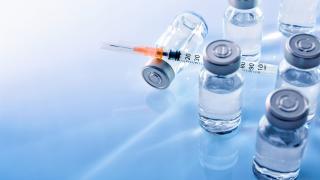As the novel coronavirus continues to spread across the United States and the world, doctors and scientists are discovering certain things about this highly contagious disease. One of their key findings is that people with diabetes — type 1 or type 2 — are more susceptible to catching COVID-19 than others, and have poorer outcomes if they do.
We turned to Fouad Kandeel , M.D., Ph.D., professor and chair of the Department of Diabetes, Endocrinology & Metabolism at City of Hope as well as a clinician who sees patients, for his expertise on the subject.
"Both type 1 and type 2 diabetes patients can have difficulty in fighting infections, including viral infections, if their blood glucose is not well controlled," explained Kandeel, the Arthur D. Riggs Distinguished Chair in Diabetes & Metabolism Research.
"And typically, type 2 patients tend to be older. And older patients tend to have a worse disease course when they contract a viral infection. The incidence of type 2 diabetes gets higher with age; by the age of 70, 40% of the population has type 2 diabetes. Type 2 patients who are older have additional risk related solely to their age and other pre-existing conditions such as cardiovascular disease."
The possibility of catching any viral infection is a concern for every person who has diabetes regardless of age, Kandeel says. But the COVID-19 virus is particularly dangerous because of its transmission and mortality rates.
"The mortality rate of COVID-19 in a younger patient who does not have comorbidities [two or more illnesses at once] such as diabetes is not very high," he said. “The mortality rate and the severity of the disease greatly increase in the older population, or the population with comorbidities such as diabetes, heart disease, cancer or other forms of immune suppression."
Kandeel urges those with diabetes to keep their disease under control as the first line of defense against the novel coronavirus. "Protect yourself by controlling your underlying medical conditions better,” he said. “If you are diabetic, make sure that you maintain your blood glucose in the target range. Engage in the physical activities that your doctor recommends and control your eating behavior. Be smart about your food intake and make sure you are eating properly, according to the guidelines set by the American Diabetes Association. Make sure you are taking all of your medications correctly."
Controlling blood sugar is key
The American Diabetes Association (ADA) also stresses that controlling blood sugar is key to helping fend off the coronavirus, noting that fluctuating blood sugar levels compromise the body’s ability to fight off an infection. The ADA's website also explains that above-target blood sugar increases inflammation in the body, and viral infections do the same. Taken together, people with diabetes are likely to have a more severe response with more serious complications.
The good news from the ADA is that "if diabetes is well-managed, the risk of getting severely sick from COVID-19 is about the same as the general population."
A key part of managing diabetes is avoiding ketones in the blood, the chemicals that your body creates when it is forced to burn fat for energy, which happens when your cells are not getting the glucose they need. "This causes a chemical imbalance in your body that in itself is a very dangerous state," Kandeel said. "Diabetic ketoacidosis — DKA — results when the body is starved for insulin, and can cause renal failure and other complications."
When your body is compromised with ketones or DKA, Kandeel said, "your risk of contracting the COVID-19 virus is increased, especially in type 1 diabetes patients." The ADA advises checking your urine and blood levels regularly to avoid ketone development, especially during this time of a pandemic virus.
Staying safe
The doctor gives sound advice for how diabetes patients can stay safe as the pandemic increases in California and beyond.
"Use common sense,” he said. “One step is social distancing — protecting yourself as much as possible from exposure. Don't go to places that are crowded. Don't get closer than 6 feet from others. You should stay away from other people and don't visit with anyone unnecessarily. Don't go outside to shop unless you must."
But what happens if you begin to have symptoms of COVID-19, despite your best efforts to maintain healthy blood sugar numbers and avoid social contact? Kandeel explains the steps you should take in that event.
"Diabetes patients should contact their primary care provider, and he or she will have to triage the situation based on the symptoms that the patient is developing. Based on that, he or she will guide the patient where to go for care and where to get testing if testing is required.”
He stresses that the symptoms that should concern diabetes patients are "mainly cough and heightened shortness of breath. If difficulty breathing or shortness of breath and high temperature and cough develop, you need to call your physician."
